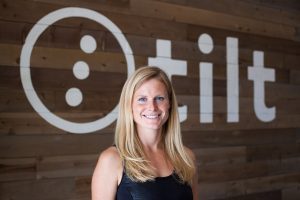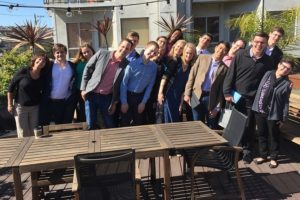News & Stories
Why visiting Tilt gave me a new perspective on employee perks

Kate Jennison (BA ’10)
San Francisco: the land of progressive workplaces, where they swap cubicles for tables and vending machines for elaborate, healthy food displays. Though these perks are undeniably cool, I’ve always had difficulty understanding why companies chose to invest so much money into them.
While on an Adams Apprenticeship networking trip, I had the opportunity to visit with UNC alums Carly Mask (BA ’10) – who works in brand partnerships – and Kate Jennison (BA ’10), director of people, at Tilt.
Kate has the responsibility of making sure Tilt employees come to work as the happiest, most productive version of themselves. To help accomplish this, Tilt offers perks such as meditation rooms, an accessible rooftop and a smorgasbord of snacks. But these things are only a small piece of the puzzle that distinguishes Tilt from other startups.

Tilt’s culture book
Here are a few ways Tilt has embedded its “people-first” mentality into its culture:
- Tilt publishes a “culture book” featuring images of employees, inspirational quotes, and short anecdotes that provide an overview of the company’s mission and the important role employees play in accomplishing it.
- Tilt offers their employees a round-trip plane ticket to anywhere in the world after their first year of employment. The company believes that travel experiences not only enrich their employees’ lives, but also help mold them into better people who become better at what they do as a result.
- Tilt allows employees to work remotely or take unlimited vacation time as needed. The company recognizes that sometimes life does not go as planned and believes that unforeseen circumstances should not limit a person’s ability to pursue their passions and contribute to something they believe in.

Callie Brauel (BSBA ’09) and Carly Mask (BA ’10) at Tilt
Tilt does not offer these perks to attract the best talent or keep pace with competitors, although those are often the effects. The company’s underlying value resides in the attention they attribute to the overall well-being of the individuals that they employ. The company genuinely cares about their employees’ lives inside and outside of the office and has created a culture that reflects this.
Kate taught us that work can be integrated with your life in a way that enhances it, rather than hindering it. Through her dedication to keep up with the lives of employees, she demonstrates the high level of humanity that can be present in a company. It is this people-centered focus that I hope to find in any future company I am with and emulate in any company I start.

Adams Apprentices visit Tilt in San Francisco
People often fall into the trap of thinking that you can either have a work life or a personal life, but not both. The culture Kate helped create at Tilt strongly disproves this pervasive notion. She has changed my perspective on the purpose of the workplace and how vital employees are to a company’s success. A company is only as strong as its people, and its people are only as strong as their well-being.
By Sam Petrie (BA ’17)